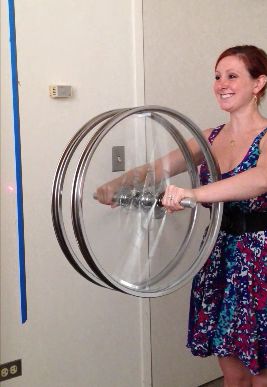Podcast: Play in new window

BOB HIRSHON (host):
Getting physical with physics. I’m Bob Hirshon and this is Science Update.
Physics is notoriously difficult to learn. But perhaps that’s because students aren’t getting physical enough with the subject. University of Chicago cognitive scientist Sian Beilock is trying to change that. In a series of experiments published in Psychological Science, her lab found that physics students mastered the concept of angular momentum best when they experienced the phenomenon for themselves, by manipulating a spinning bicycle wheel on a rod. What’s more, brain scans revealed differences between the hands-on learners and those who merely observed.
SIAN BEILOCK (University of Chicago):
We showed that those students who’d had this physical experience were actually more likely to activate areas of the brain important in planning and executing actions. And this seems to have positive consequences for reasoning on tests.
HIRSHON:
Beilock thinks the hand-on approach could enhance other kinds of science learning, as well. I’m Bob Hirshon, for AAAS, the science society.
Story by Susanne Bard
